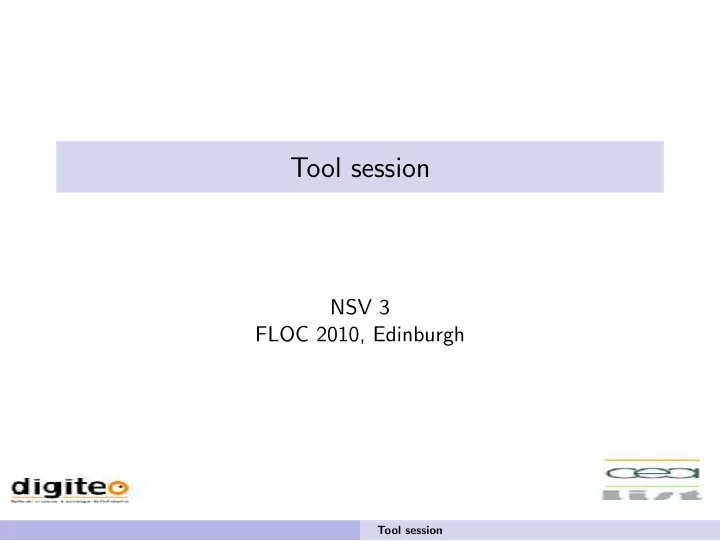

Tool session NSV 3 FLOC 2010, Edinburgh Tool session
Organisation ◮ Quick presentation of an initial set of benchmarks ◮ 30 minutes break, except for tool owners ◮ Quick demo/synthesis of the benchmarks for each tool (5 minutes each) ◮ Discussion: ◮ Tool competition as a stimulus for validation of numerical software? ◮ How to constitute a widely accepted set of benchmarks? (on a wiki?) ◮ How to classify tools? ◮ What are the other initiatives in that direction? Tool session
Some comments on tools (I) Huge variety of tools, able to prove/disprove a variety of properties... ◮ Model-checking/SMT: recent on numerical properties (e.g. SMV), full temporal logics. Checks properties, does not synthetise them. ◮ Abstract interpreters (e.g. Astr´ ee, Fluctuat, Polyspace etc.): mostly invariant synthesis, but can check assertions. Generally used without functional specs, checking against implicit specs (no RTE, precision, etc.). ◮ Provers, based on theorem provers (e.g. Frama-C/Jessie...): can be used for inferring a wide class of (generally invariant) properties - human-assisted process. Tool session
Some comments on tools (II) ◮ Dynamic checkers, including testing environments, alternative arithmetics (stochastic, interval etc.). Checks some properties (temporal, precision etc.) on single executions. Can be used to formally disprove properties (counter-examples). All these tools may consider idealized semantics of some level... (real number semantics, floating-point number semantics with some assumptions on the evaluation order etc.) hence might be difficult to compare. They might also take rather different languages as input, or fragments of them... Tool session
Description of the benchmarks (from the FLUCTUAT distribution) Name Characteristic Property of interest absor.c lin. prec. middl.c lin. prec./funct. golde-a/b.c (non-)lin., stat. loop prec./stability assoc.c lin. prec. norma.c non-lin. comparison? polyn.c non-lin. comparison? inter-a/b.c array/dyn. loop comparison? inver.c non-lin.,pointer,bit,dyn. loop convergence filte.c lin., unbounded loop invariant cav10.c non-lin. invariant Tool session
Description of the benchmarks (provided by Sylvie Boldo) Name Characteristic Property of interest Dekker.c non-lin., stat. loop exact+invariants/variants Malcolm.c lin.,dyn. loop exact+invariants/variants Sterbenz.c lin. exact discri.c non-lin.,interproc,stat. loop precision eps line1.c lin. ? rec lin2.c lin.,stat. loop ? Tool session
Description of the benchmarks (provided by Nathalie Revol) Name Characteristic Property of interest count to 6.c non-lin.,stat. loop precision muller.c non-lin.,stat. loop precision/stability sum.c array,stat. loop precision integration.c (non-)lin.,stat. loop precision/stability Rump.c non-lin. precision Tool session
Description of the benchmarks (provided by Stephen Siegel - FEVS) (functional equivalence - C+MPI; careful: file IO) Name Characteristic Property of interest adder.c lin.,stat. loop,array+para. bad init diffusion1d.c lin.,stat. loop,array+para. bad indices diffusion2d.c lin.,stat. loop,array+para. wrong update factorial.c lin.,recursive wrong init fib.c lin.,dyn. loop bad scheme gausselim.c lin.,stat. loop,array bad col. update integrate.c non-lin.,recursive+para. bad use of MPI laplace.c lin.,dyn. loop,array+para. bad topology etc. Tool session
Description of the benchmarks (here, on the web, Gulwani’s group) Name Characteristic Property of interest spmeter.c lin.,unb. loop invariant hidden.c lin.,dyn. loop invariant dloop.c lin.,stat. loop invariant etc. Tool session
Starting a discussion ◮ How and where to set up an “unbiaised” set of benchmarks? Would extracts from the litterature be OK? (Gulavani etc.) NEC Small Static Analysis Benchmark... Relevance to “numerical software”? ◮ What initial format? C+annotations? what language of annotations (C assert? ACSL? other...)? ◮ What properties? ◮ small, big? as an ultimate goal? checking just one specificity? ◮ in real numbers? floating-point numbers? ◮ value invariants (typical of automatic static analyzers)? functional properties (typical of proof based tools)? ◮ oracles? ◮ What tool categories? Model-checkers, abstract interpreters, provers, dynamic analyzers etc.? Tool session
Recommend
More recommend